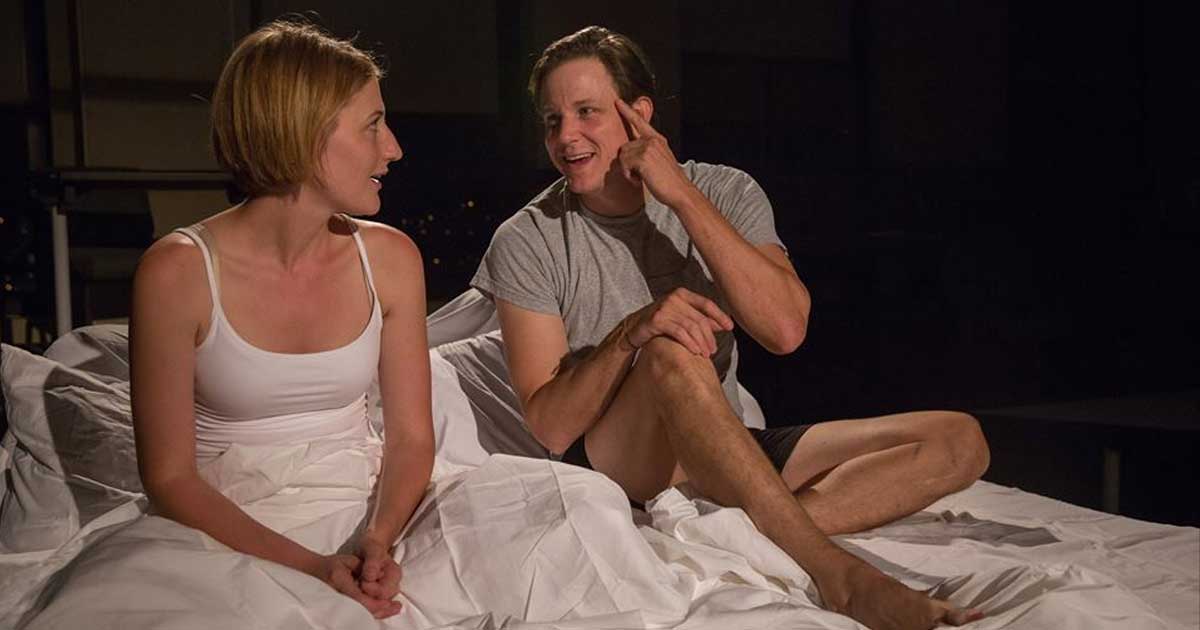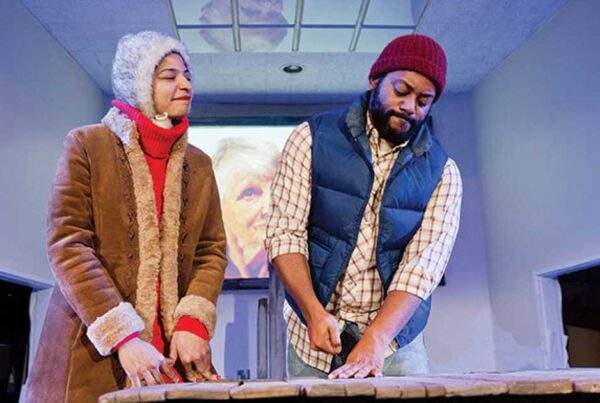
‘Burgh Vivant – In Tom Stoppard’s cerebral play, “The Hard Problem” the playwright explores René Descartes famous philosophical proposition, “Cogito ergo sum,” or, more roughly translated, “I think therefore I am.”
A young attractive researcher, Hilary (Alex Spieth), tackles a conundrum that has faced many scientists as she attempts to reconcile science with her faith. Her tutor-cum-paramour, Spike (Andrew William Smith), is an atheistic pragmatist, whereas Hilary clings to her religion. Their viewpoints are on opposite ends of the spectrum, and their post-coital conversation covers altruism, Darwinian evolution, probability, divine creation and, most importantly, altruism vs. egoism. Who doesn’t want to chat about non-overlapping magisteria after sex? The couple quarrels about art vs. science in their underwear, and it becomes a STEAMy affair.
Meanwhile, the researcher is up for a prestigious job at the Krohl Institute. Hilary undergoes a bizarre interview with Leo (Ken Bolden) where she has to compete for the gig against a mathematician, Amal (Vinny Anand). Because Leo is running late, the rivals coincidentally encounter Jerry (Randy Kovitz), the institute’s billionaire backer.
Time passes and Hilary is situated at her job. She has good friends at the institute; Julia (Fredi Bernstein), a Pilates instructor, and her lover, Ursula (Daine Michelle Griffith). She even gains an assistant, Bo (Claire Hsu).
When Cathy (Grace Vensel), the billionaire’s daughter, wanders into Hilary’s lab one day, a long-buried secret bubbles to the surface, and an unplanned rendezvous with Spike in Venice begins a new series of difficulties in her life. Hilary’s problems begin to pile up like a Fibonacci sequence, each mistake adding to the last, doubling in intensity.
In fiction, coincidences always mount up, sometimes straining the willing suspension of disbelief. Stoppard roasts the old chestnut by steeping the play in a deep conversation about probabilities. He cleverly weaves an argument about random chance into the fabric of the tale. Is there a benevolent force drawing people to certain events, or is it all just a series of random accidents?
Spieth’s Hilary is dazzling. She has a charismatic stage presence. It’s easy to see why so many characters in the play find her utterly irresistible.
Accolades must be given to Quantum mainstays such as Griffith, Bolden and Kovitz. Bernstein, a newcomer to the Quantum stage, is a delight, as is the youngest member of the cast, Vensel.
Bo is a multifaceted creation and Hsu performs it with aplomb but, because there are a lot of characters, Bo gets short shrift. Stoppard could have spent a little more time delving into the complexities of her personality.
Director Rachel M. Stevens keeps the actors in a tight, Spartan square. When the actors are not on stage, they look upon the action with a dispassionate gaze. It creates an eerie effect.
Scenic designer Stephanie Mayer-Staley’s set is saturated in a ghostly white, like a Clean Room – with props. Projection designer, Joe Spinogatti creates elaborate illusions that add an intricate layer to the production.
Warning: If you’re looking for an evening of light entertainment, seek your pleasures elsewhere. Some theater-goers may find “The Hard Problem” pretentious and languid.
There is an odd juxtaposition to “The Hard Problem.” While it revels in its intellectual gyrations, the adoption storyline is exaggeratedly simplistic – like a Scooby Doo mystery, there’s only one suspect.
“The Hard Problem” is, literally and figuratively, a consciousness-raising endeavor…




